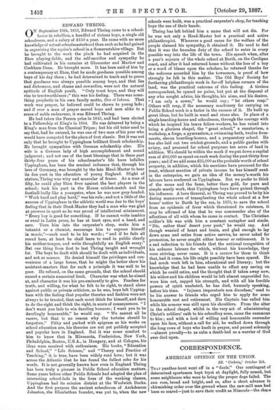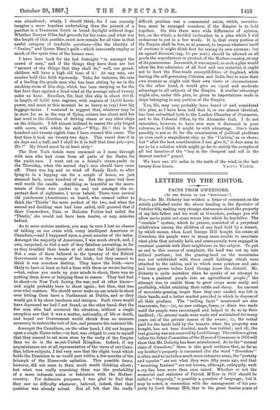CORRESPONDENCE.
AMERICAN OPINION ON THE UNION. SS. Umbria,' October 5th. THAT panther.hunt went off in a "fizzle." Our contingent of determined sportsmen kept tryst at daylight, fully armed, but some neighbours who were to bring the proper dogs failed. The sun rose, broad and bright, and so, after a short advance in skirmishing order over the ground where the saw-mill man had been so scared—just to save their credit as Nimrods—the chars
was abandoned ; wisely, I should think, for I can scarcely imagine a more hopeless undertaking than the pursuit of a panther in a Tennessee forest in broad daylight without dogs. Whether Sawyer Giles had grounds for his scare, and what was 'the length of that panther, must now remain for all time in that useful category of insoluble questions—like the identity of 7unine," and Queen Mary's guilt—which innocently employ so much of the spare time of the human race.
I have been back for the last fortnight "in amongst the crowd of men," and if the things they have done are but "earnest of the things that they shall do," well, our grand- children will have a high old time of it! At any rate, our cousins hold this faith vigorously. Take, for instance, the case of a leading dry-goods man who has been sitting by me in the smoking-room of this ship, which has been carrying us for the last four days against a head-wind at the average rate of twenty miles an hour. Recollect, Sir, that this ship is about 400 ft- in length, of 8,800 tons register, with engines of 14,000 horse- power, and must at this moment be as heavy as (say) four big luggage-trains. I ventured to suggest that, whatever may be in store for us in the way of flying, science has about said her last word in the direction of driving steam or any other ships on the Atlantic. I felt almost inclined to resent the pity tinged with scorn, with which he said,—" Why, Sir ! this is the hundred and twenty-eighth time I have crossed this ocean. The first time it took me twenty-two days. This vessel does it in six days and a half, and I shall do it in half that time yet,—yes, Sir !" My friend must be at least sixty !
The New York hotels were crammed as I came through with men who had come from all parts of the States for the yacht-race. I went out on a friend's steam-yacht on the Thureday, when the second day's race should have come off. There was fog and no wind off Sandy Hook, so after lying-to in a lopping sea for a couple of hours, we just ateamed back, some hundred of us. But the game had been well worth the candle. Anything so beautiful as the move- ments of those two yachts in and out amongst the ex- pectant fleet of sightseers, I never beheld. There were several old yatchemen (Americans) on board, who seemed rather to think the 'Thistle' the more perfect of the two, and when the second and deciding race had been sailed, still guessed that if their Commodore, Pain, or Malcolm Forbes had sailed the 'Thistle,' she would not have been twelve, or any, minutes behind.
As to more serious matters, you may be sure I lost no chance of talking on our crisis with every intelligent American or Canadian,—and I happened upon a great number of the latter. Amongst the majority of Americans, I was much struck, and, I own, surprised, to find a sort of lazy fatalism prevailing, so far es they troubled their heads at all about the Irish Question. Not a man of them believed in the tyranny of the British Government or the wrongs of the Irish; but they seemed to think it was somehow destiny. They knew the Irish—were likely to have at least as bad a time with them as we are having —but, unless you made up your minds to shoot, there was no -putting them down or bringing them to reason. They had had to shoot—in New York during the war, and at other times— and might probably have to shoot again ; but then, that was over vital matters. We should never make up our minds to shoot over letting them have a Parliament at Dublin, and so they would get it by sheer insolence and intrigue. Such views would have depressed me had I not found, on the other hand, that the few men who had mastered the situation, without a single -exception saw that it was a matter, nationally, of life or death, and hoped our Government would shrink from no measure necessary to restore the rule of law, and preserve the national life.
Amongst the Canadians, on the other hand, I did not happen upon a single Home-ruler,—in fact, was obliged to own to myself that they seemed to set more store by the unity of the Empire than we do in the as-yet-United Kingdom. Indeed, if my acquaintances are at all representative of the views of our Cana- dian fellow-subjects, I feel very sure that the slight bond which holds the Dominion to us would part within a few months of the triumph of the Home-rule agitation. This possible fiasco, however, did not seem to them much worth thinking about ; hut what was really exercising them was the probability of a more intimate union or federation with the Mother- country. For defensive purposes, I was glad to find that they saw no difficulty whatever ; believed, indeed, that that question was already solved. But all felt that the really difficult problem was a commercial union, which, neverthe- less, must be managed somehow, if the Empire is to hold together. On this there were wide differences of opinion, but, on the whole, a decided inclination to a plan which I will endeavour to put in a few words. It is, that every portion of the Empire shall be free, as at present, to impose whatever tariff of customs it might think best for raising its own revenue; but an agreed discount (say, 10 per cent.) should be allowed on all goods the manufacture or product of the Mother-country, or any of its possessions. Inasmuch, it was argued, as such a plan would allow the free admission of all food and raw material, it ought not to hurt the Free-trade susceptibilities of England, while leaving the self-governing Colonies and India free to raise their own revenue as might suit their own views or circumstances. On the other hand, it would give an equal and moderate advantage to all subjects of the Empire. A similar advantage might also, under this plan, be given to importations made in ships belonging to any portion of the Empire.
Yon, Sir, may very probably have heard of and considered this plan, as I have been told that it, or one almost identical, has been submitted both to the London Chamber of Commerce, and to the Colonial Office, by Sir Alexander Galt. I do not remember, however, to have ever seen it discussed in your columns, as I think it might be with advantage. One's brain possibly is not so fit for the examination of political problems on even such a magnificent ship as the 'Umbria,' as on shore; but "after the best consideration I can give it," it does seem to me to he a solution which might go far to satisfy the scruples of all bat fanatics of the "buy in the cheapest and sell in the dearest market" gospel.
We have run 435 miles in the teeth of the wind, in the last



































 Previous page
Previous page